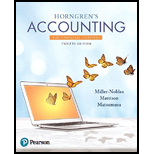
Horngren's Accounting, The Financial Chapters (12th Edition)
12th Edition
ISBN: 9780134486789
Author: Tracie L. Miller-Nobles, Brenda L. Mattison, Ella Mae Matsumura
Publisher: PEARSON
expand_more
expand_more
format_list_bulleted
Concept explainers
Textbook Question
Chapter 6, Problem S6A.12SE
Computing periodic inventory amounts—LIFO
Learning Objective 7 Appendix 6A
Compute ending merchandise inventory and cost of goods sold for Flexon using the LIFO inventory Costing method.
Expert Solution & Answer
Want to see the full answer?
Check out a sample textbook solution
Students have asked these similar questions
Please provide the accurate answer to this general accounting problem using appropriate methods.
None
Please provide the solution to this general accounting question with accurate financial calculations.
Chapter 6 Solutions
Horngren's Accounting, The Financial Chapters (12th Edition)
Ch. 6 - Which principle or concept states that business...Ch. 6 - Which inventory costing method assigns to ending...Ch. 6 - Assume Nile.com began April with 14 units of...Ch. 6 - Suppose Nile.com used the weighted-average...Ch. 6 - Which inventory costing method results in the...Ch. 6 - Which of the following is most closely linked to...Ch. 6 - At December 31, 2018, Stevenson Company overstated...Ch. 6 - Suppose Maestro’s had cost of goods sold during...Ch. 6 - Suppose used the LIFO inventory costing method and...Ch. 6 - Prob. 1RQ
Ch. 6 - Prob. 2RQCh. 6 - Prob. 3RQCh. 6 - Prob. 4RQCh. 6 - Discuss some measures that should be taken to...Ch. 6 - Under a perpetual inventory system, what are the...Ch. 6 - When using a perpetual inventory system and the...Ch. 6 - During periods of rising costs, which inventory...Ch. 6 - What does the lower-of-cost-or market (LCM) rule...Ch. 6 - What account is debited when recording the...Ch. 6 - What is the effect on cost of goods sold, gross...Ch. 6 - When does an inventory error cancel out, and why?Ch. 6 - How is inventory turnover calculated, and what it...Ch. 6 - How is days’ sales inventory calculated, and what...Ch. 6 - When using the periodic inventory system, which...Ch. 6 - When using periodic inventory system and...Ch. 6 - Determining inventory accounting principles...Ch. 6 - Determining inventory costing methods Learning...Ch. 6 - Preparing a perpetual Inventory record and journal...Ch. 6 - Preparing a perpetual inventor, record and journal...Ch. 6 - Preparing a perpetual inventor record and journal...Ch. 6 - Preparing a perpetual inventory record and journal...Ch. 6 - Comparing Cost of Goods Sold under FIFO, LIFO, and...Ch. 6 - Applying the lower-of-cost-or-market rule Learning...Ch. 6 - Determining the effect of an inventory error...Ch. 6 - Computing the rate of inventory turnover and days’...Ch. 6 - Computing periodic inventory amounts—FIFO Learning...Ch. 6 - Computing periodic inventory amounts—LIFO Learning...Ch. 6 - Computing periodic inventory...Ch. 6 - Using accounting vocabulary Learning Objective 1,...Ch. 6 - Comparing inventory methods Learning Objective 2...Ch. 6 - Measuring and journalizing merchandise inventory...Ch. 6 - Measuring and journalizing merchandise inventory...Ch. 6 - Measuring ending inventory and cost of goods sold...Ch. 6 - Comparing amounts for cost of goods sold, ending...Ch. 6 - Comparing cost of goods sold and gross...Ch. 6 - Applying the lower-of-cost-or-market rule to...Ch. 6 - Applying the lower-of-cost-or-market rule to...Ch. 6 - Measuring the effect of an inventory error...Ch. 6 - Correcting an inventory error-two years Learning...Ch. 6 - Computing inventory turnover and days’ sales in...Ch. 6 - Comparing ending merchandise inventory, cost of...Ch. 6 - Computing periodic inventory amounts Learning...Ch. 6 - Accounting for inventory using the perpetual...Ch. 6 - Accounting for inventory using the perpetual...Ch. 6 - Accounting principles for inventory and applying...Ch. 6 - Prob. P6.31APGACh. 6 - Prob. P6A.32APGACh. 6 - Prob. P6.33BPGBCh. 6 - Prob. P6.34BPGBCh. 6 - Accounting principles for inventory and applying...Ch. 6 - Prob. P6.36BPGBCh. 6 - Prob. P6A.37BPGBCh. 6 - Prob. P6.38CTCh. 6 - Prob. P6.39CPCh. 6 - Prob. P6.40PSCh. 6 - Prob. 1CPCh. 6 - Prob. 2CPCh. 6 - Prob. 3CPCh. 6 - Prob. 4CPCh. 6 - Prob. 5CPCh. 6 - Prob. 6CPCh. 6 - Prob. 7CPCh. 6 - Prob. 8CPCh. 6 - Prob. 9CPCh. 6 - Prob. 10CPCh. 6 - Prob. 11CPCh. 6 - Prob. 6.1TIATCCh. 6 - Prob. 6.1DCCh. 6 - Prob. 6.1FSC
Knowledge Booster
Learn more about
Need a deep-dive on the concept behind this application? Look no further. Learn more about this topic, accounting and related others by exploring similar questions and additional content below.Similar questions
- Can you solve this general accounting problem with appropriate steps and explanations?arrow_forwardPlease explain the solution to this general accounting problem with accurate explanations.arrow_forwardCan you solve this general accounting question with the appropriate accounting analysis techniques?arrow_forward
- Please provide the answer to this general accounting question with proper steps.arrow_forwardCan you help me solve this general accounting question using valid accounting techniques?arrow_forwardI am trying to find the accurate solution to this general accounting problem with the correct explanation.arrow_forward
arrow_back_ios
SEE MORE QUESTIONS
arrow_forward_ios
Recommended textbooks for you
 Cornerstones of Financial AccountingAccountingISBN:9781337690881Author:Jay Rich, Jeff JonesPublisher:Cengage Learning
Cornerstones of Financial AccountingAccountingISBN:9781337690881Author:Jay Rich, Jeff JonesPublisher:Cengage Learning Financial And Managerial AccountingAccountingISBN:9781337902663Author:WARREN, Carl S.Publisher:Cengage Learning,Century 21 Accounting Multicolumn JournalAccountingISBN:9781337679503Author:GilbertsonPublisher:Cengage
Financial And Managerial AccountingAccountingISBN:9781337902663Author:WARREN, Carl S.Publisher:Cengage Learning,Century 21 Accounting Multicolumn JournalAccountingISBN:9781337679503Author:GilbertsonPublisher:Cengage Excel Applications for Accounting PrinciplesAccountingISBN:9781111581565Author:Gaylord N. SmithPublisher:Cengage Learning
Excel Applications for Accounting PrinciplesAccountingISBN:9781111581565Author:Gaylord N. SmithPublisher:Cengage Learning Financial Accounting: The Impact on Decision Make...AccountingISBN:9781305654174Author:Gary A. Porter, Curtis L. NortonPublisher:Cengage Learning
Financial Accounting: The Impact on Decision Make...AccountingISBN:9781305654174Author:Gary A. Porter, Curtis L. NortonPublisher:Cengage Learning

Cornerstones of Financial Accounting
Accounting
ISBN:9781337690881
Author:Jay Rich, Jeff Jones
Publisher:Cengage Learning

Financial And Managerial Accounting
Accounting
ISBN:9781337902663
Author:WARREN, Carl S.
Publisher:Cengage Learning,

Century 21 Accounting Multicolumn Journal
Accounting
ISBN:9781337679503
Author:Gilbertson
Publisher:Cengage


Excel Applications for Accounting Principles
Accounting
ISBN:9781111581565
Author:Gaylord N. Smith
Publisher:Cengage Learning

Financial Accounting: The Impact on Decision Make...
Accounting
ISBN:9781305654174
Author:Gary A. Porter, Curtis L. Norton
Publisher:Cengage Learning
Chapter 6 Merchandise Inventory; Author: Vicki Stewart;https://www.youtube.com/watch?v=DnrcQLD2yKU;License: Standard YouTube License, CC-BY
Accounting for Merchandising Operations Recording Purchases of Merchandise; Author: Socrat Ghadban;https://www.youtube.com/watch?v=iQp5UoYpG20;License: Standard Youtube License